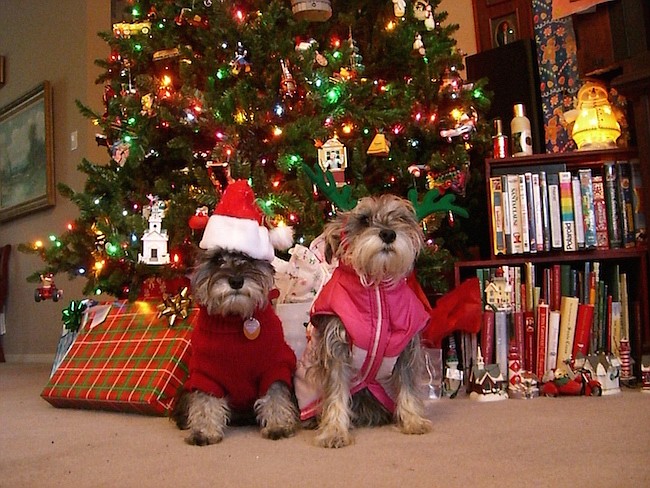- July 26, 2024
-
-
Loading

Loading

The holiday season is all about family and friends, including our four-legged friends. We want our dogs to be part of the festivities, but we also need to make sure they stay safe and stress free. According to many vets, the holidays are one of the most dangerous times of the year for pets. What can you do to make sure their holiday is safe and stress free? Here are some suggestions.
• While I believe it’s OK to feed your dog table scraps as long as you have a healthy diet, there are some foods that can be dangerous. Foods such as grapes and raisins, onions, chocolate, caffeine, certain nut and seeds, xylitol, and others should be avoided. If you’re uncertain, don’t give it to your dog.
• Be extra careful about securing garbage. For example, make sure your dog can’t get to the turkey carcass. Unfortunately, I know a dog who did and didn’t survive.
• Make sure your Christmas tree is secure so it can’t fall over. Keep your dog away from the tree, especially the tree water which contains fertilizers. Place delicate, breakable ornaments out of reach of wagging tails! Watch where you put lights on the lower part of the tree. Dogs can inadvertently get burned or shocked from lights and wires.
• Don’t decorate the tree with food! This may encourage your dog to want to eat the tree, causing a variety of health problems from simple upset stomachs to intestinal punctures and blockages, both potentially requiring surgery.
• Keep presents out of reach, especially any food presents.
• Be careful with seasonal plants such as holly and mistletoe. These plants are toxic to both dogs and cats, and can cause severe intestinal upset, a sudden drop in blood pressure, breathing problems, and even hallucinations. Puppies and senior dogs are at most risk for poisoning from holiday plants. It’s a misconception that poinsettias are poisonous, they aren’t. If ingested, they will often cause nausea and vomiting, nothing more.
• If your dog receives gifts from well-meaning friends and family members, examine them carefully before giving them to your dog. Not all toys, chews, or treats will be appropriate for your dog.
• Supervise dogs and children playing together. The stress to your dog could be too much and he may bite.
• Try to remain calm yourself (your dog can sense your stress) and keep to your dog’s regular routine (especially exercise) as much as possible. This will reduce your dog’s stress.
• Put your dog someplace safe and stress free during holiday parties and large family gatherings. Often dogs are stressed when there are too many people around. Then there’s the issue of doors or fence gates being accidently being left open, giving your dog the opportunity to run off.
• Make sure your dogs have proper identification in the event they do get out.
The holidays can be both exciting and stressful for humans and our pets. As such, plan to spend quality time alone with your dog every day. Dogs have a wonderful way of reducing our stress levels, and in turn, they cherish the time we spend with them. In doing so, we both benefit, leading to a happier holiday season for all.
Sherri Cappabianca, an expert in the field of canine health and fitness, is the author of two books on canine health, and co-owner of Rocky’s Retreat, an intimate and personal boarding, daycare, hydrotherapy and fitness center, and Barking Dog Fitness, a Gym for Dogs, both located in Orlando. For more information, visit rockysretreat.com or barkingdogfitness.com.